APHRODITE MYTHS 1
Greek Name
Αφροδιτη
Transliteration
Aphroditê
Latin Spelling
Aphrodite
Translation
Venus
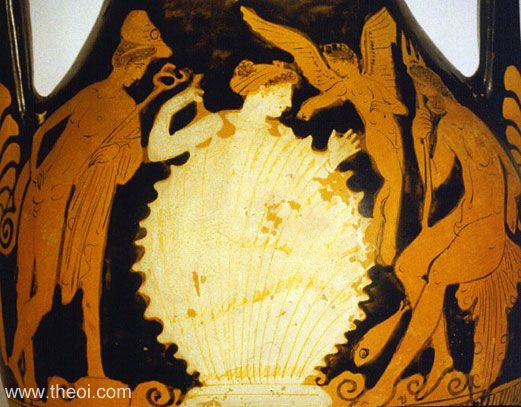
APHRODITE was the Olympian goddess of love, beauty, pleasure and procreation.
This page contains tales of the goddess from the saga of the gods including her birth from the sea-foam, flight from the monster Typhoeus, role in the war of the Giants, creation of Pandora, birth of Priapos, and contests with other gods.
CLASSICAL LITERATURE QUOTES
THE BIRTH OF APHRODITE
Cicero, De Natura Deorum 3. 21 - 23 (trans. Rackham) (Roman rhetorician C1st B.C.) :
"[Cicero enumurates a number of rival cult traditions about Aphrodite sourced from different regions:] The first Venus [Aphrodite] is the daughter of Caelus (Sky) [Ouranos] and Dies (Day) [Hemera]; I have seen her temple at Ellis. The second was engendered form the sea-foam, and as we are told became the mother by Mercurius [Hermes] of the second Cupidus (Love) [Eros]. The third is the daughter of Jupiter [Zeus] and Dione, who wedded Vulcanus [Hephaistos], but who is said to have been the mother of Anteros by Mars [Ares]. The fourth we obtained from Syria and Cyprus, and is called Astarte; it is recorded that she married Adonis."
I. BORN OF THE SEA-FOAM
The most common version of the birth of Aphrodite describes her born in sea-foam from the castrated genitals of the sky-god Ouranos.
Hesiod, Theogony 176 ff (trans. Evelyn-White) (Greek epic C8th or 7th B.C.) :
"Ouranos (the Sky) came, bringing on night and longing for love, and he lay about Gaia (the Earth) spreading himself full upon her. Then the son [Kronos] from his ambush stretched forth his left hand and in his right took the great long sickle with jagged teeth, and swiftly lopped off his own father's members and cast them away to fall behind him . . . and so soon as he had cut off the members with flint and cast them from the land into the surging sea, they were swept away over the main a long time: and a white foam spread around them from the immortal flesh, and in it there grew a maiden. First she drew near holy Kythera, and from there, afterwards, she came to sea-girt Kypros, and came forth an awful and lovely goddess, and grass grew up about her beneath her shapely feet. Her gods and men call Aphrodite, and Aphrogeneia (the foam-born) because she grew amid the foam, and well-crowned (eustephanos) Kythereia because she reached Kythera, and Kyprogenes because she was born in billowy Kypros, and Philommedes (Genital-Loving) because sprang from the members. And with her went Eros (Love), and comely Himeros (Desire) followed her at her birth at the first and as she went into the assembly of the gods. This honour she has from the beginning, and this is the portion allotted to her amongst men and undying gods,--the whisperings of maidens and smiles and deceits with sweet delight and love and graciousness."
Homeric Hymn 6 to Aphrodite (trans. Evelyn-White) (Greek epic C7th to 4th B.C.) :
"To Sea-set Kypros the moist breath of the western wind (Zephryos) wafted her [Aphrodite] over the waves of the loud-moaning sea in soft foam, and there the gold-filleted Horai (Seasons) welcomed her joyously. They clothed her with heavenly garments: on her head they put a fine, well-wrought crown of gold, and in her pierced ears they hung ornaments of orichalc and precious gold, and adorned her with golden necklaces over her soft neck and snow-white breasts, jewels which the gold-filleted Horai wear themselves whenever they go to their father's house to join the lovely dances of the gods. And when they had fully decked her, they brought her to the gods, who welcomed her when they saw her, giving her their hands. Each one of them prayed that he might lead her home to be his wedded wife, so greatly were they amazed at the beauty of violet-crowned Kythereia."
The Anacreontea, Fragment 57 (trans. Campbell, Vol. Greek Lyric II) (C5th B.C.) :
"[Aphrodite] roaming over the waves like sea-lettuce, moving her soft-skinned body in her voyage over the white calm sea, she pulls the breakers along her path. Above her rosy breast and below her soft neck a great wave divides her skin. In the midst of the furrow, like a lily wound among violets, Kypris shines out from the clam sea. Over the silver on dancing dolphins ride guileful Eros and laughing Himeros (Desire), and the chorus of bow-backed fish plunging in the waves sports with Paphia where she swims."
Diodorus Siculus, Library of History 5. 55. 4 (trans. Oldfather) (Greek historian C1st B.C.) :
"Aphrodite, they say, as she was journeying [after her birth in the sea] from Kytherea to Kypros and dropped anchor near Rhodes, was prevented from stopping there by the sons of Poseidon, who were arrogant and insolent men; whereupon the goddess, in her wrath, brought a madness upon them."
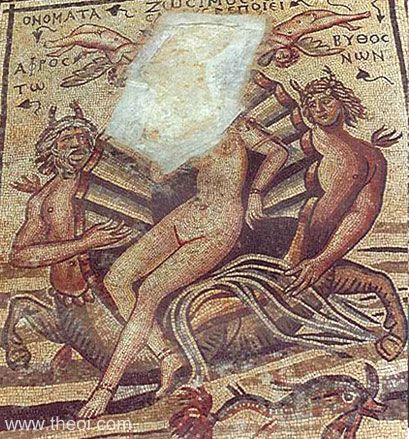
Pausanias, Description of Greece 5. 11. 8 (trans. Jones) (Greek travelogue C2nd A.D.) :
"[Depicted on the throne of Zeus at Olympia:] is Eros (Love) receiving Aphrodite as she rises from the sea, and Aphrodite is being crowned by Peitho (Persuasion)."
Pausanias, Description of Greece 2. 1. 8 :
"[Depicted on the base of the statue of Poseidon at Korinthos:] Thalassa (Sea) holding up the young Aphrodite, and on either side are the nymphs called Nereides."
Aelian, On Animals 14. 28 (trans. Scholfield) (Greek natural history C2nd A.D.) :
"Aphrodite delighted to be with Nerites in the sea [after her birth] and loved him. And when the fated time arrived, at which, at the bidding of [Zeus] the Father of the gods, Aphrodite also had to be enrolled among the Olympians, I have heard that she ascended and wished to bring her companion and play-fellow. But the story goes that he refused."
Orphic Hymn 55 to Aphrodite (trans. Taylor) (Greek hymns C3rd B.C. to 2nd A.D.) :
"Aphrodite . . . sea-born (pontogenes) . . . Kypros thy famed mother fair."
Quintus Smyrnaeus, Fall of Troy 5. 72 ff (trans. Way) (Greek epic C4th A.D.) :
"Out of the sea was rising lovely-crowned Kypris, foam-blossoms still upon her hair; and round her hovered smiling witchingly Himeros (Desire), and danced the Kharites (Graces) lovely-tressed."
Ovid, Metamorphoses 4. 521 ff (trans. Melville) (Roman epic C1st B.C. to C1st A.D.) :
"I [Aphrodite] should find some favour with the sea, for in its holy depths in days gone by from sea-foam I was formed, and still from foam I take my name in Greece."
Ovid, Heroides 7. 59 ff (trans. Showerman) (Roman poetry C1st B.C. to C1st A.D.) :
"For 'twas from the sea, in Cytherean waters, so runs the tale, that the mother of the Amores (Loves) [Erotes], undraped, arose."
Seneca, Phaedra 274 ff (trans. Miller) (Roman tragedy C1st A.D.) :
"Thou goddess, born of the cruel sea, who art called mother of both Cupides (Loves) [i.e. Eros and Himeros or Anteros]."
Apuleius, The Golden Ass 4. 28 ff (trans. Walsh) (Roman novel C2nd A.D.) :
"The goddess [Aphrodite] who was sprung from the dark-blue depths of the sea and was nurtured by the foam from the frothing waves."
Apuleius, The Golden Ass 6. 6 ff :
"The clouds parted, and Caelus (Heaven) [i.e. Ouranos] admitted his daughter."
Nonnus, Dionysiaca 1. 86 ff (trans. Rouse) (Greek epic C5th A.D.) :
"Did not the water conceive Aphrodite by a heavenly husbandry [Ouranos], and bring her forth from the deeps?"
Nonnus, Dionysiaca 7. 222 ff :
"Kronos . . . cut his father's loins with unmanning sickle until the foam got a mind and made the water shape itself into a selfperfected birth, delivered of Aphrodite from the sea?"
Nonnus, Dionysiaca 12. 43 ff :
"He [Kronos] cut off his father's [Ouranos'] male plowshare, and sowed the teeming deep with seed on the unsown back of the daughterbegetting sea (Thalassa)."
Nonnus, Dionysiaca 13. 435 ff :
"When the fertile drops from Ouranos, spilt with a mess of male gore, hand given infant shape to the fertile foam and brought forth Paphia [Aphrodite]."
Nonnus, Dionysiaca 13. 435 ff (trans. Rouse) (Greek epic C5th A.D.) :
"Kypros, godwelcoming island of the fine-feathered Erotes (Loves), which bears the name of Kypris the self-born [Aphrodite] . . . Paphos, garlanded harbour of the softhaired Erotes (Loves), landingplace of Aphrodite when she came up out of the waves, where is the bridebath of the seaborn goddess."
Nonnus, Dionysiaca 41. 20 ff :
"Before Kypros and the Isthmian city of Korinthos, she [i.e. the city of Beroe or Beruit in Phoinikia] first received Kypris [Aphrodite] within her welcoming portal, newly born from the brine; when the water impregnated from the furrow of Ouranos was delivered of deepsea Aphrodite; when without marriage, the seed plowed the flood with male fertility, and of itself shaped the foam into a daughter, and Phusis (Nature) was the midwife--coming up with the goddess there was that embroidered strap which ran round her loins like a belt, set about the queen's body in a girdle of itself . . . Beroe first received Kypris; and above the neighbouring roads, the meadows of themselves put out plants of grass and flowers on all sides; in the sandy bay the beach became ruddy with clumps of roses . . .
There, as soon as she was seen on the neighbouring harbourage, she brought forth wild Eros (Love) . . . without a nurse, and [Eros] beat on the closed womb of his unwedded mother; then a hot one even before birth, he shook his light wings and with a tumbling push opened the gates of birth." [N.B. In this passage Aphrodite is born pregnant with Eros who she births on the day of her own birth.]
For MORE information on the castration of Ouranos see OURANOS
II. DAUGHTER OF ZEUS & DIONE
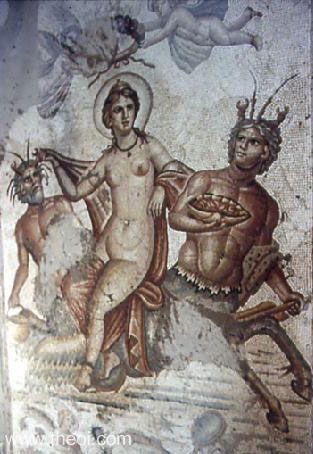
A less common version makes Aphrodite a daughter of Zeus and the Okeanis Titanis Dione. Aphrodite and Dione both had temples in the sanctuary of Zeus at Dodona.
Homer, Iliad 5. 370 ff (trans. Lattimore) (Greek epic C8th B.C.) :
"[Aphrodite wounded at Troy by Diomedes fled to her mother Dione on Olympos :] Bright Aphrodite fell at the knees of her mother [on Olympos], Dione, who gathered her daughter into her arms' fold and stroked her with her hand and called her by name and spoke to her : ‘Who now of the Ouranian gods, dear child, has done such things to you, rashly, as if you were caught doing something wicked?’ . . . Dione the shining among divinities . . . with both hands stroked away from her arm the ichor, so that the arm was made whole again and the strong pains rested."
Homer, Odyssey 8. 267 ff (trans. Shewring) (Greek epic C8th B.C.) :
"[Hephaistos threatens to return Aphrodite to her father Zeus when he learns of her adultery :] ‘Aphrodite had Zeus for father . . . my cunning chains shall hold them both fast till her father Zeus has given me back all the betrothal gifts I bestowed on him for his wanton daughter.’"
Euripides, Helen 1098 ff (trans. Vellacott) (Greek tragedy C5th B.C.) :
"We pray to you, child of Dione, Aphrodite."
Pseudo-Apollodorus, Bibliotheca 1. 13 (trans. Aldrich) (Greek mythographer C2nd A.D.) :
"By Dione he [Zeus] had Aphrodite."
Nonnus, Dionysiaca 14. 193 ff (trans. Rouse) (Greek epic C5th A.D.) :
"Kypris [Aphrodite] fled like the wind from the pursuit of her lascivious father [Zeus], that she might not see an unhallowed bedfellow in her own begetter, Zeus."
For MORE information on this Titan-goddess see DIONE
III. HATCHED FROM AN EGG (SYRIAN ASHTARTE)
Aspects of this story from the Syrian story of the birth of Ashtarte were adopted by the Greeks. Doves and fish remain sacred to her, and the minor Greek love-gods Eros and Helene are described as egg-born.
Pseudo-Hyginus, Fabulae 197 (trans. Grant) (Roman mythographer C2nd A.D.) :
"Into the Euphrates River an egg of wonderful size is said to have fallen, which the fish rolled to the bank. Doves sat on it, and when it was heated, it hatched out Venus [Ashtarte, the Syrian Aphrodite], who was later called the Syrian goddess. Since she excelled the rest in justice and uprightness, by a favour granted by Jove [Zeus], the fish were put among the number of the stars, and because of this the Syrians do not eat fish or doves, considering them as gods."
APHRODITE & THE WAR OF THE GIANTS
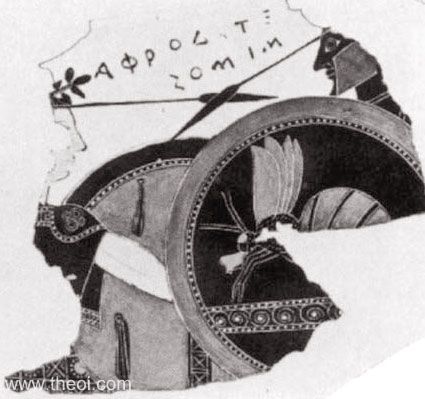
In Greek vase paintings depicting the Gigantomakhia, Aphrodite is sometimes depicted driving the chariot of Ares into battle.
Strabo, Geography 11. 2. 10 (trans. Jones) (Greek geographer C1st B.C. to C1st A.D.) :
"In Phanagoreia [in Mysia] there is a notable temple of Aphrodite Apatouros (Deceiver). Critics derive the etymology of the epithet of the goddess by adducing a certain myth, according to which the Gigantes attacked the goddess there; but she called upon Herakles for help and hid him in a cave, and then, admitting the Gigantes one by one, gave them over to Herakles to be murdered through ‘treachery’ (apate)."
For MORE information on the War of the Giants see GIGANTES
APHRODITE & THE GIANT TYPHOEUS
Aphrodite was identified with the Syrian goddess Ashtarte. The Greeks invented the story of her flight to Egypt to explain why the goddess was worshipped in the form of a fish or why this fish was sacred to her in the country.
Pseudo-Hyginus, Astronomica 2. 30 (trans. Grant) (Roman mythographer C2nd A.D.) :
"Fishes [constellation Pisces] . . . Diognetus Erythraeus says that once Venus [Aphrodite] and her son Cupid [Eros] came in Syria to the river Euphrates [when Typhon attacked Olympos]. There Typhon, of whom we have already spoken, suddenly appeared. Venus and her son threw themselves into the river and there changed their forms to fishes, and by so doing this escaped danger. So afterwards the Syrians, who are adjacent to these regions, stopped eating fish, fearing to catch them lest with like reason they seem either to oppose the protection of the gods, or to entrap the gods themselves."
Ovid, Metamorphoses 5. 319 ff (trans. Melville) (Roman epic C1st B.C. to C1st A.D.) :
"Typhoeus, issuing from earth's lowest depths, struck terror in those heavenly hearts, and they all turned their backs and fled, until they found refuge in Aegyptus and the seven-mouthed Nilus . . . Typhoeus Terrigena (Earthborn) even there pursued them and the gods concealed themselves in spurious shapes . . . Venus [Aphrodite] became a fish."
Ovid, Fasti 2. 458 ff (trans.Boyle) (Roman poetry C1st B.C. to C1st A.D.) :
"Piscis, heaven's horses. They say that you and your brother (for your stars gleam together) ferried two gods on your backs. Once Dione [Aphrodite], in flight from terrible Typhon (when Jupiter [Zeus] armed in heaven's defence), reached the Euphrates with tiny Cupidos [Eros] in tow and sat by the hem of Palestine's stream. Poplars and reeds dominated the tops of the banks; willows, too, offered hope of concealment. While she hid, the wood roared with wind. She pales with fear, and believes a hostile band approaches. As she clutched son to breast, she cries : ‘To the rescue, Nymphae, and bring help to two divinities.’ No delay; she leapt. Twin fish went underneath them; for which, you see, the present stars are named. Hence timid Syrians think it wrong to serve up this species; they defile no mouths with fish."
For MORE information on this giant see TYPHOEUS
APHRODITE & THE FEASTS OF THE GODS
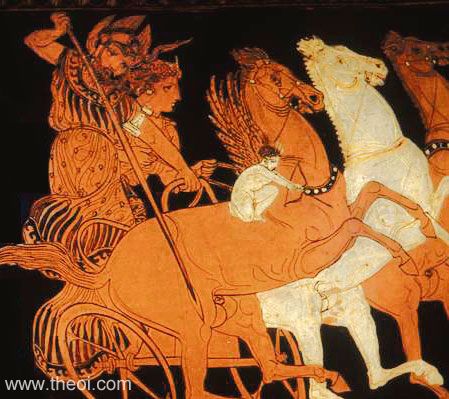
Homeric Hymn 3 to Pythian Apollo 186 ff (trans. Evelyn-White) (Greek epic C7th - 4th B.C.) :
"[Apollon journeys to] Olympos, to the house of Zeus, to join the gathering of the other gods: then straightway the undying gods think only of the lyre and song, and all the Mousai (Muses) together, voice sweetly answering voice . . . Meanwhile the rich-tressed Kharites (Graces) and cheerful Horai (Seasons) dance with Harmonia (Harmony) and Hebe (Youth) and Aphrodite, daughter of Zeus, holding each other by the wrist."
Anacreon, Fragment 357 (trans. Campbell, Vol. Greek Lyric II) (C6th B.C.) :
"Lord [Dionysos], with whom Eros the subduer and the blue-eyed Nymphai, and radiant Aphrodite play, as you haunt the lofty mountain peaks."
Plato, Symposium 178 (trans. Lamb) (Greek philosopher C4th B.C.) :
"On the birthday of Aphrodite there was a feast of the gods . . . [during which Penia seduced the god Poros and bore Eros.] And because Aphrodite is herself beautiful, and also because he [Eros] was born on her birthday, is her follower and attendant."
Pseudo-Hyginus, Fabulae 165 (trans. Grant) (Roman mythographer C2nd A.D.) :
"Minerva [Athena] is said to have been the first to make pipes from deer bones and to have come to the banquet of the gods to play. Juno [Hera] and Venus [Aphrodite] made fun of her because she was grey-eyed and puffed out her cheeks, so mocked her playing and called her ugly."
APHRODITE & THE CREATION OF PANDORA
Aphrodite bestowed her gifts on Pandora the first woman, commissioned by Zeus to punish mankind for Prometheus' theft of fire.
Hesiod, Works and Days 60 ff (trans. Evelyn-White) (Greek epic C8th or 7th B.C.) :
"He [Zeus] bade famous Hephaistos make haste and mix earth with water and to put in it the voice and strength of human kind, and fashion a sweet, lovely maiden-shape, like to the immortal goddesses in face; and Athene to teach her needlework and the weaving of the varied web; and golden Aphrodite to shed grace upon her head and cruel longing and cares that weary the limbs. And he charged Hermes the Guide, Argeiphontes, to put in her a shameless mind and a deceitful nature. So he ordered. And they obeyed the lord Zeus Kronion . . . [and after her creation they] named this woman Pandora (All-Gifts), because all they who dwelt on Olympus gave each a gift, a plague to men who eat bread."
For MORE information on the first woman see PANDORA
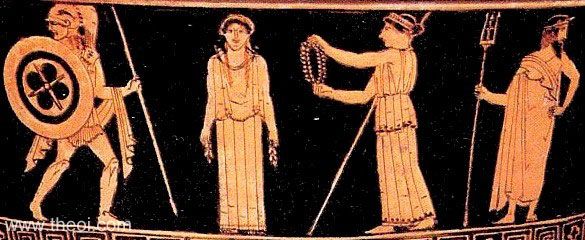
APHRODITE & THE BIRTH OF PRIAPUS
Diodorus Siculus, Library of History 4. 6. 1 (trans. Oldfather) (Greek historian C1st B.C.) :
"Now the ancients record in their myths that Priapos was the son of Dionysos and Aphrodite and they present a plausible argument for this lineage; for men when under the influence of wine find the members of their bodies tense and inclined to the pleasures of love."
Pausanias, Description of Greece 9. 31. 2 (trans. Jones) (Greek travelogue C2nd A.D.) :
"[Priapos] called by them [the people of Lampsakos] a son of Dionysos and Aphrodite."
Suidas s.v. Priapus (trans. Suda On Line) (Byzantine Greek lexicon C10th A.D.) :
"Priapos: was conceived from Zeus and Aphrodite; but Hera in a jealous rage laid hands by a certain trickery on the belly of Aphrodite and readied a shapeless and ugly and over-meaty babe to be born. His mother flung it onto a mountain; a shepherd raised it up. He had genitals [rising up] above his butt."
For MORE information on this god see PRIAPOS
THE CONTEST OF APHRODITE & HERMES AT THE PYTHIAN GAMES
The gods were sometimes described as competing at the founding of the Olympic and Pythian Games, the latter including musical contests.
Ptolemy Hephaestion, New History Book 7 (summary from Photius, Myriobiblon 190) (trans. Pearse) (Greek mythographer C1st to C2nd A.D.) :
"Apollon organised funeral games [the Pythia] in honour of Python [the dragon of Delphoi]; Hermes contributed to it, like Aphrodite; she won and accepted as prize a zither which she gave later as a gift to Alexandros [Paris]."
THE WEAVING-CONTEST OF APHRODITE & ATHENA
Aphrodite challenged Athena to a contest in weaving. The goddess of love proved to be totally inept in the art and was easily defeated by Athena. A brief extract from this tale, as told by Nonnus, follows:--
Nonnus, Dionysiaca 24. 261 ff (trans. Rouse) (Greek epic C5th A.D.) :
"The dancers of Orkhomenos [the Kharites] who were attendants upon Paphia [Aphrodite] had no dancing then to do [when Aphrodite entered a contest against Athena in weaving]; but Pasithea made the spindle run round, Peitho dressed the wool, Aglaia gave thread and yarn to her mistress. And weddings went all astray in human life. Aion (Time), the ancient who guides our existence, was disturbed, and lamented the bond of wedlock used no more; Eros unhonoured loosed his fiery bowstring, when he saw the world's furrow unplowed and unfruitful. Then the harp made no lovely music, the syrinx did not sound, the clear pipes did not sing in clear tones Hymen Hymenaios the marriage-tune."
SOURCES
GREEK
- Homer, The Iliad - Greek Epic C8th B.C.
- Homer, The Odyssey - Greek Epic C8th B.C.
- Hesiod, Theogony - Greek Epic C8th - 7th B.C.
- Hesiod, Works and Days - Greek Epic C8th - 7th B.C.
- Epic Cycle, The Cypria Fragments - Greek Epic C7th - 6th B.C.
- Greek Lyric II Anacreon, Fragments - Greek Lyric C6th B.C.
- Greek Lyric II Anacreontea, Fragments - Greek Lyric C5th - 4th B.C.
- Greek Lyric III Ibycus, Fragments - Greek Lyric C6th B.C.
- Euripides, Helen - Greek Tragedy C5th B.C.
- Plato, Symposium - Greek Philosophy C4th B.C.
- Apollodorus, The Library - Greek Mythography C2nd A.D.
- Diodorus Siculus, The Library of History - Greek History C1st B.C.
- Strabo, Geography - Greek Geography C1st B.C. - C1st A.D.
- Pausanias, Description of Greece - Greek Travelogue C2nd A.D.
- The Orphic Hymns - Greek Hymns C3rd B.C. - C2nd A.D.
- Aelian, On Animals - Greek Natural History C2nd - 3rd A.D.
- Ptolemy Hephaestion, New History - Greek Mythography C1st - 2nd A.D.
- Quintus Smyrnaeus, Fall of Troy - Greek Epic C4th A.D.
- Nonnus, Dionysiaca - Greek Epic C5th A.D.
ROMAN
- Hyginus, Fabulae - Latin Mythography C2nd A.D.
- Hyginus, Astronomica - Latin Mythography C2nd A.D.
- Ovid, Metamorphoses - Latin Epic C1st B.C. - C1st A.D.
- Ovid, Fasti - Latin Poetry C1st B.C. - C1st A.D.
- Ovid, Heroides - Latin Poetry C1st B.C. - C1st A.D.
- Apuleius, The Golden Ass - Latin Novel C2nd A.D.
BYZANTINE
- Photius, Myriobiblon - Byzantine Greek Scholar C9th A.D.
- Suidas, The Suda - Byzantine Greek Lexicon C10th A.D.
BIBLIOGRAPHY
A complete bibliography of the translations quoted on this page.